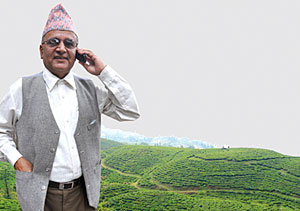 |
Taranath Sharma retired from his job as the executive director of the National Tea and Coffee Development Board six years ago but that has not stopped him from travelling across the country teaching farmers about the benefits of tea farming. He has been involved in the development of tea farming in Nepal for the last thirty years. Farmers in Ilam, Panchthar, Jhapa, Terathum and Dhankuta fondly call him the teacher of tea.
He first learnt about the commercial farming of tea from Robert William, who frequently recounted the success of Ugandan farmers in tea farming. This inspired Sharma to start tea farming with four farmers in Ilam nearly 35 years ago. Today, tea farming has spread to 18,000 farmers in five districts.
Wherever Sharma goes, he takes tea farming along. Thanks to his initiative, tea cultivation was begun in Nuwakot, Sindhupalchok, Dolakha and Ramechhap. Now he is visiting the villages of Bhaktapur and Kabhre to explore the possibilities of tea farming there. He is also working to introduce a cooperative approach to tea farming. A National Tea Farmers Cooperative has been recently set up for the purpose. "A cooperative approach will help in the commercialisation of tea farming," he says.
Sharma himself has cultivated tea on 7.5 hectares of land in Panchakanya. His two sons are also working as tea specialists. He is disappointed, however, that his colleagues on the tea board did not make use of their knowledge after their retirement. "Rather than living an anonymous existence in the city, it is better to go to the villages to share one's experience," he says.
READ ALSO:
Missing goats
Budget, when?
Cleaners gathering dust
American dreams


